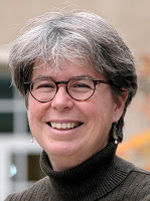“I’m spiritual, but not religious,” is a current catchphrase, often deployed to suggest that I’m aware there is more to the universe than I can see or express, but I want to be sure you know that I reject any organized religion. But how often do you hear “I’m religious, but not spiritual?” Can you be one without the other?
Two articles appeared in my email this week tackling aspects of each of these questions, one of those seeming serendipitous juxtapositions that makes me wonder if the Holy Spirit is indulging in a bit of fun.
Writing in the website The Jesuit Post, Tim O’Brien, S.J., wonders about poet Marie Howe’s assertion that she isn’t a religious poet. As her poetry makes use of imagery any Catholic would find familiar, such as the Annunciation, Ordinary Time, and the Good Thief, it seems a logical conclusion to draw. Howe begs to differ: “…religious isn’t the word I relate to … I’m interested in the metaphysical.”
Does a poet have to be writing intentionally about God, to be writing religious poetry, to write in a way that brings us closer to God, that helps us deepen our living out of our particular religious tradition?
O’Brien suggests not. Poetry, he notes, can connect us to the core experiences of faith: awe, wonder, pity, praise in ways that a theological tome cannot. It can help us bridge the gap between the transcendent and the everyday world.
“There is an intimate connection between the contemplative vision of the poet, and the contemplative vision of … well, religious contemplatives. Both share a cultivated sensitivity to the world around us, and the world beyond us,” says O’Brien.
As St. Augustine suggested, we can read God’s Word not only in sacred scripture, but in the world around us. Poets can teach us to hear that Word more clearly, to engage with it more deeply within our religious tradition. It’s spiritual, and religious.
Meanwhile in the New York Times, anthropologist Tanya Luhrman is wondering if you can become addicted to prayer. Can you be too spiritual? She describes a young woman who was so overcome by prayer that she wept. It was exhausting, and she worried that she might be crazy. So she stopped.
How do we find the balance in our prayer lives between the spiritual — the interior movements of our hearts, minds and souls — and the religious — the expression of these movements within our Catholic tradition? How can we tell when it is God speaking to us, through the words of poets, or in our tears?
Like a poet, a religious tradition gives us a way to read overwhelming experiences of awe and wonder. Is God there in this experience? Is this a good way for me to pray? When is it too much?
In his reflection on Howe and religious writing, O’Brien points out that, “A slender bit of verse can capture a powerful religious insight…,” reminding me of the Desert Fathers, the men and women who sought God in the deserts of Egypt 16 centuries ago.
People perplexed by their prayer lives sometimes undertook what must have been long and difficult journeys to one of these desert solitaries to “give them a word.” A slender thread of advice to help keep them safe in prayer, something against which to measure their experiences of the transcendent. The modern day tradition of spiritual direction has its roots in these offerings of wisdom.
Trappist monk and poet Thomas Merton once wrote, “Just remaining quietly in the presence of God, listening to Him, being attentive to Him, requires a lot of courage and know-how.”
When it comes to being spiritual and religious, perhaps the poets can give us the courage to see the world with different eyes — eyes of faith — and the spiritual directors can help us develop the wisdom to know when to blink.
***
The Jesuit Post is an online magazine written and edited by young Jesuits. It’s about “Jesus, politics, and pop-culture, it’s about the Catholic Church, sports, and Socrates. It’s about making the case for God (better: letting God make the case for Himself) in our secular age.”
Read more about the balance between the esoteric (the spiritual) and the exoteric (religious traditions) in Timothy Luke Johnson’s short essay, “Dry Bones.”
Learn more about the modern day tradition of Catholic spiritual direction at Loyola Press’ Ignatian Spirituality.
***
Michelle Francl-Donnay is a member of Our Mother of Good Counsel Parish in Bryn Mawr. She also writes the blog Quantum Theology.
PREVIOUS: Annulment query leads to bigger point: how to question church teaching
NEXT: Catholics and resuscitation; so what if a Mass lasts an hour?




Share this story